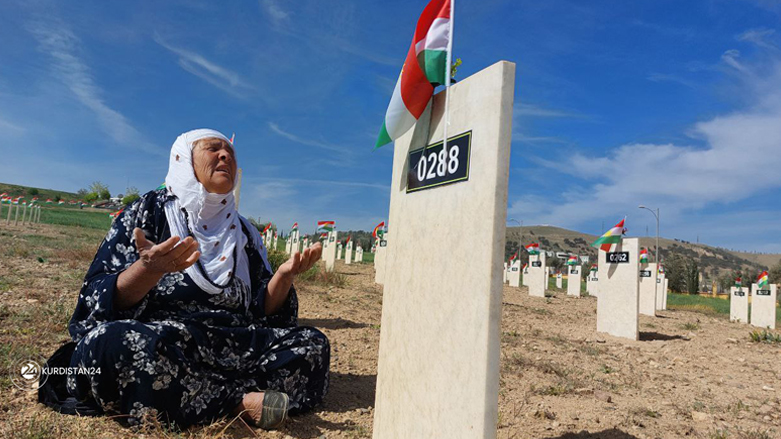Kurdistan Region commemorates 34th anniversary of Anfal in Garmiyan
Feyli Kurds were the first victims taken to that camp in the early 1980s. Many Iraqi opposition figures to the regime were also imprisoned there.

ERBIL (Kurdistan 24) – In the late 1980s, thousands of Kurdish civilians were displaced from their villages at the hands of the former Iraqi regime of Saddam Hussein and taken to notorious prison camps before they were massacred.
The Anfal Campaign resulted in the killings of at least 180,000 civilians, including women and children, by the former Iraqi regime. Only a small fraction of the mass graves, primarily located in the southern Iraqi provinces, have been unearthed over 30 years later.
Every year on Apr. 14, people across the Kurdistan Region commemorate the Anfal genocide. On that day in 1988, the Anfal genocide began in Garmiyan. That mass-murder campaign largely took place in the rural areas of Kalar and Chamchamal towns.
Thousands of civilians from the Garmiyan area were taken to Topzawa military base and prison camp in Kirkuk province in large military trucks. The women and children were systematically segregated from the male inmates before being taken to Nogra Salman camp in Samawa in the harsh southern desert of Iraq near the border with Saudi Arabia.
Feyli Kurds were the first victims taken to that camp in the early 1980s. Many Iraqi opposition figures to the regime were also imprisoned there.
The camp's notorious name is still associated with some of the worst atrocities committed by the former Iraqi regime.

Survivors, victims' relatives, and activists visited the camp on Thursday to commemorate the tragedy.
Last October, the Iraqi government attempted to restore the Topzawa camp in Kirkuk as an active military base again. However, it was prevented from doing so following a strong backlash from activists and residents in the area.
Per the Iraqi 2005 constitution, the Iraqi state is obligated to compensate the victims and survivors of the genocides and atrocities of the former regime.
Kurdish officials have repeatedly called on the Iraqi federal government to fulfill this responsibility. According to officials in the autonomous region, survivors of the crimes have not yet been compensated in any way.
